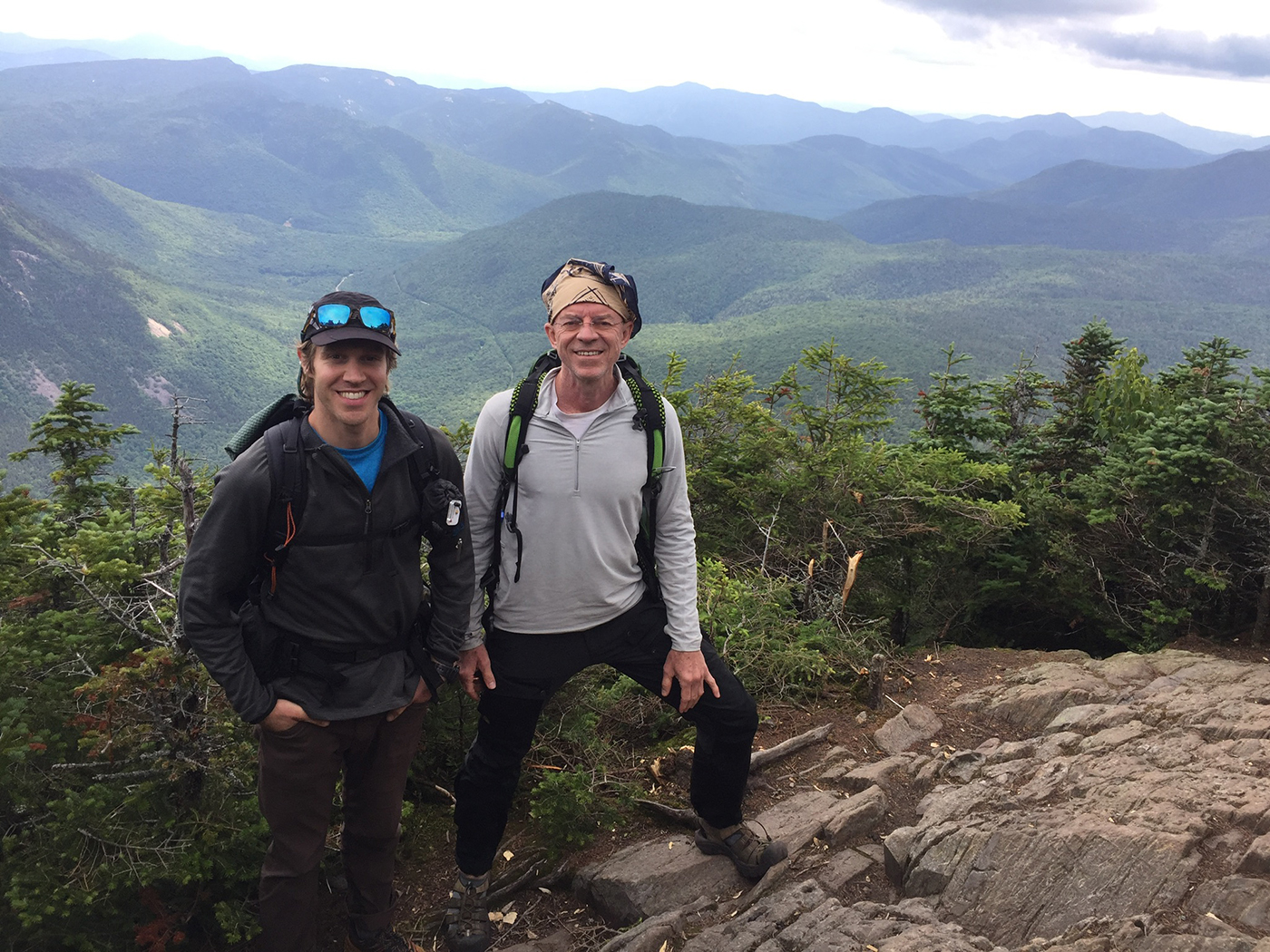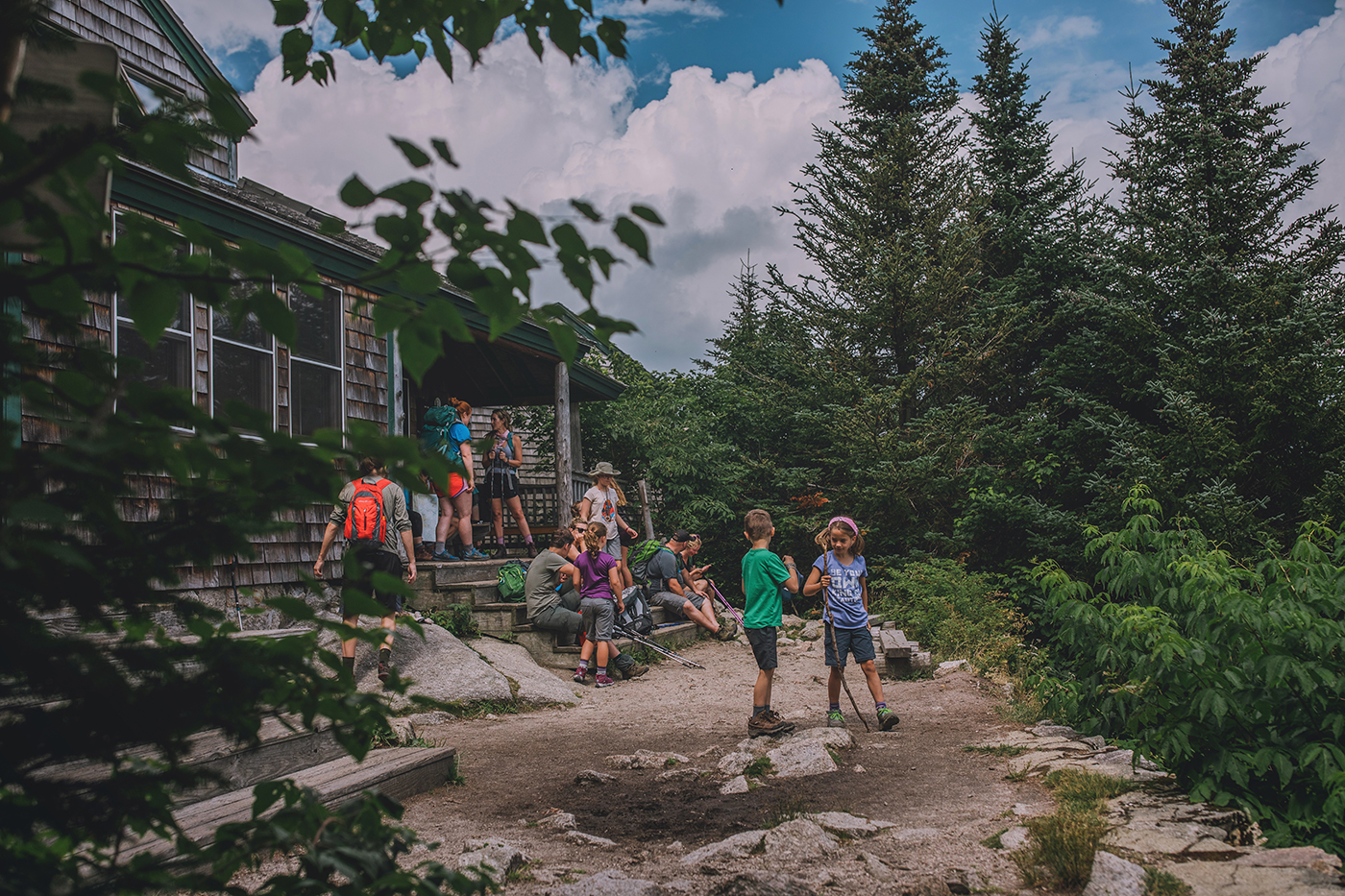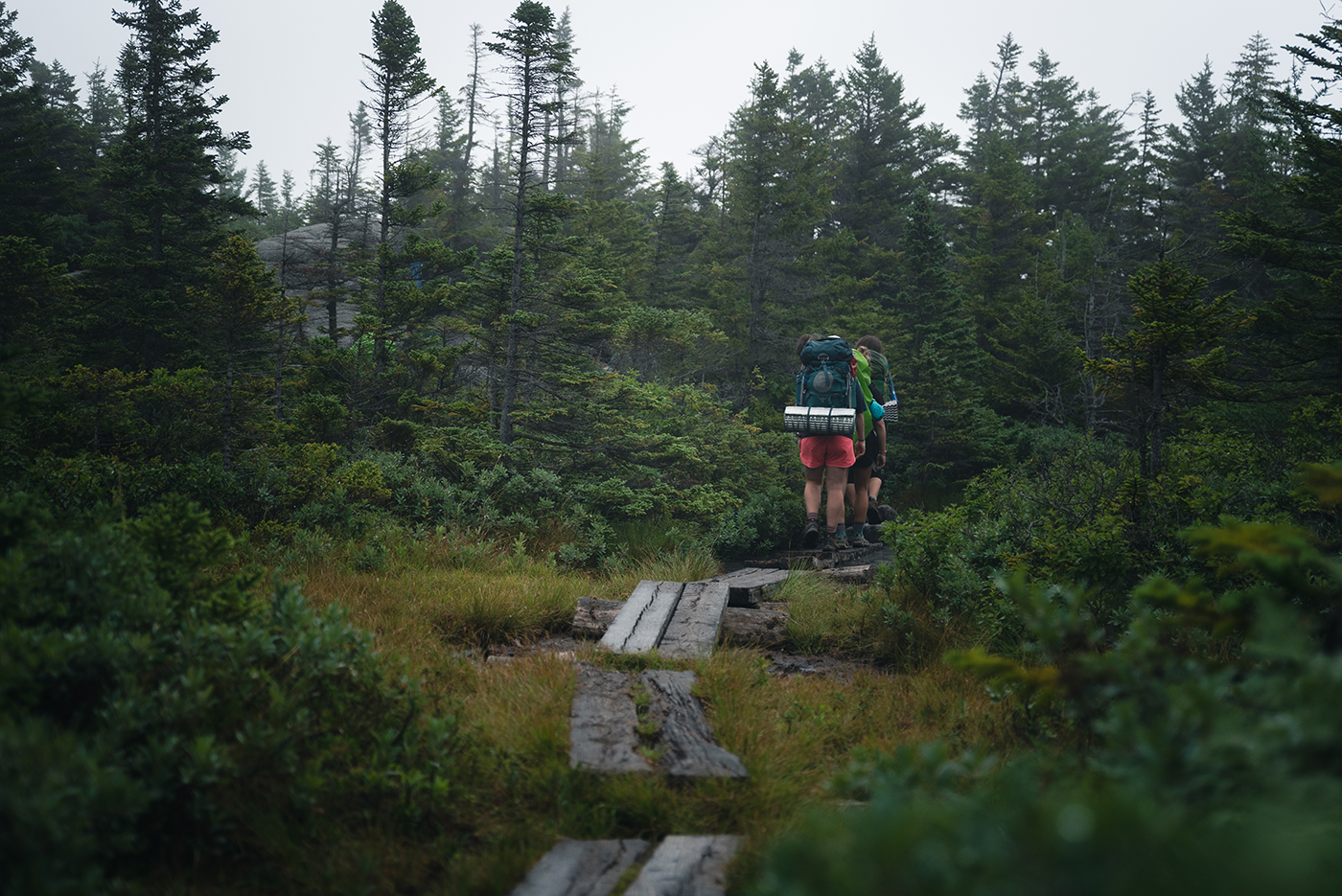
AMC outdoor guide Carter Owens (left) with Charles “Quill” Paxson, for whom he designed a custom adventure in the Pemigewasset Wilderness in 2021.
Each year, hikers converge on Springer Mountain in Georgia in early March to begin a 2,192-mile, six-month pilgrimage along the Appalachian Trail (A.T.) with the goal of summiting Katahdin in Maine. Most hikers adopt colorful trail names, like Peregrine or Chilly Willy, as a way to more quickly recall and connect with each other.
It’s late July, and I am backpacking just north of the Pemigewasset Wilderness in New Hampshire’s White Mountain National Forest. After 20 years of hiking to huts and day-hiking with my daughter and friends, more solo treks appear to be in my future. To build my wilderness confidence and learn the basics of map and compass, AMC guide Carter Owens has joined me on my three-night adventure. Owens, 28, is affable, athletic, bright, and gentle. He hails from Georgia, though with his golden locks and beautiful smile could just as well have been born in Garrison Keillor’s fictional Minnesota town of Lake Wobegon. The son of a hunter and a mother who loves the ocean, Carter has formed for himself a love of hiking mountainous wilderness. Carter, whose trail name is “Nine Bears,” and his former partner Hazel had thru-hiked the Appalachian trail in 2016. I found Carter by calling AMC and requesting a backpacking guide, and Sara DeLucia—AMC’s guided adventure success manager—described all manner of hikes and itineraries for me. I considered group programs, but I wanted the full attention of an experienced guide and flexibility to fit my schedule. Carter’s life and mine were now converging for three nights on Ethan Pond Trail, deep in the White Mountains, circumventing Whitewall Mountain and Lincoln Woods.
***
At 6:45 a.m. earlier that morning, the call of nature distracts me from catching the 75 bus just outside my Cambridge condo doorstep; a half cup of steaming coffee was left cooling somewhere in the house as I scramble to an adjacent street to catch another city bus. A different call to nature had catalyzed my trip to the Pemigewasset Wilderness. On the bus, I ask the young woman sitting beside me whether the bus descends into the subway bowels or stops at ground level. Astonished that I had interrupted her podcast, she flatly said, “ground level.” I hoist my 36-pound pack over my shoulders, steady myself on the slowing bus, and disembark-. The COVID-19 pandemic had couped me up in the city for too long; I am eager to be amidst the birches.
Carter is waiting for me when my coach bus pulls into Littleton, N.H., at 11:30 a.m. He drives us 22 miles in a shuttle to AMC’s Highland Center. As I step out of the van, I see a white board showing the forecast, a packing list, and our itinerary. Over lunch, we ensure our safety by cross-checking the list, discarding common items, planning our map and compass teaching times, and generally discussing the trek to come. From the head of the Zealand Trail mid-afternoon, Carter and I strap on our backpacks and disappear into the woods for three days.
***

AMC Zealand Falls Hut is hub of activity for hikers young and old.
After a short hike to AMC’s Zealand Falls Hut, Nine Bears searches the hut to say hello to a friend, whom he cannot find. We tuck our packs under the hut benches and hike Twinway Trail, our destination – Zeacliff – for a view of Whitewall Brook, cliffs, and the next day’s path: Ethan Pond Trail. The poet Milton observed, “Mountains on whose barren breast / The laboring clouds do often rest,” so we break out our rain gear. But back at the hut, cold dampness infiltrates my shoulders. The staff supplies me with a rain poncho to stave off hypothermia. Rookie mistake number one.
The A.T. pilgrims are trickling in and a bubble of some 1,600 hikers are about two weeks out, according to a random thru-hiker we meet on the trail. The locals savor the event. “Angels” offer rides, sandwiches and drinks, and beds to hobbling hikers. We realize that we will likely have the nearby campsite to ourselves, and so we settle into a sylvan glade with flat bedding of soft pine needles close to babbling waters.
Tents set up, water filtered, a cooking area built, and a sink hole dug to collect dish water and expectorated toothpaste, we bushwhack and make use of the remaining daylight to string up our bear bag line. That is when our only trip fiasco begins. As we attempt to hang a bear bag line high in a tree, we struggle to affix a tossable rock to the end of the line. Unfortunately, rocks fly from our makeshift harnesses, an occasional successful toss taunts us, frictionally stuck in a tree fork hanging beyond reach. We need a stone bag, nevertheless I marvel at Carter’s patience. We finally string the line a mere hundred feet from camp that will be ready for us to hoist and hang our bear bag after dinner. We celebrate with a burrito bowl feast.
In the post-dinner darkness, we don our headlamps and set out to hang the bear bag. The reflective cord should show itself in our sweeping beams, we hope. Our singular focus disorients us. We disagree on the direction back to camp, and in a moment of dread I think, “Good grief, an unrestful sleep in the bushes just outside of my tent—humiliating!” Lost, I stay put. Carter hikes in a single direction, keeping contact between us using our lights. He spots the camp. We establish a camp light and shortly after, hang our bag. I had witnessed an extremely experienced wilderness guide get turned around—and calmly recover. As novices, we believe that only our naiveté is to blame if we falter but keeping safe in the backcountry requires constant awareness—pros included. The next morning, Carter demonstrates the daylight compass bearing that would have eased our search. However, if all had gone as planned, I would not have learned these valuable lessons.
***
The thru-hikers in New Hampshire at this time of year—destination Katahdin—are eager for the views and driven to make miles each day. Carter and I come out of the wilderness just before 25 mile-per-hour winds and a 20 degrees Fahrenheit wind chill arrive on August 1. The A.T. hikers window of opportunity for a successful summit in Maine is narrow. Most A.T. hikers do not pack for winter hiking, and as a consequence endure some stressful—and chilly—days and nights. The terrain steepens in the White Mountains, and it’s rugged.
The boulder- and root-strewn trails call for awareness. At the end of my trip walking the main strip of Lincoln, N.H., seeking the Gypsy Cafe for lunch, an older man calls out to me. “Where are you headed?” he asks in the grizzly voice of a smoker. He’s sitting with his legs splayed wide on top of an ice cream picnic table, his face sunburned and deeply grooved, with shoulder-length gray hair, and a hoop earring.
“Home to Cambridge,” I answer.
“I used to work in Kendall Square, Cambridge, in a steel mill in the ’90s,” he offers. “I hate Cambridge.”
“I love it,” I say.
And so, we converse. Keith, 68, claims that bears are no threat—it’s the bull moose that hikers should beware. He describes trudging an inclined trail, eyes transfixed on boot to stone, boot to root, until his forehead bumped the rump of a bull moose. The moose was lunching on paper-thin birch bark. Keith describes standing mesmerized in terror. The moose turned his massive head to contemplate, then meandered into the thicket. Keith acknowledges my desire to solo hike, but says, “It’s safer hiking with a partner.” We exchange cell numbers.
***

Hiking near the Pemigewasset Wilderness, adventurers can find both solitude and lifelong connections with the folks they meet on the trail.
Back on the Ethan Pond trail, Carter delights in sharing his plant knowledge. I taste wild blueberries, lemony sorrel leaves, minty creeping snowberry, and Indian cucumber-root. As I gaze at red fruit of bunchberry, I wonder how Carter can spot these plants navigating boulders and roots?
At Ethan Pond, we enjoy the comforts of a compostable solid waste privy built and managed by AMC with the rule of no peeing in it—which I consider a skill possessed by experts only. Under the cooking tarp in the camp site, Carter and I boil egg noodles for Pad Thai, complete with warmed peanut butter, soy sauce, red pepper, and garlic. I came for hiking and to learn compass and map skills, but the meals have been mouthwatering. We meet thru-hikers Chafe (you have to laugh) and Mr. Bojangles, a man of 40 some years, with a thick red beard, watery beady eyes, and a red bandana. Laid off from his electrician job in Georgia, Bo suddenly felt a pang for dirt, trees, and solitude. Despite an injury that required him to wear a knee brace, he had the guts for a long walk. He holds natural beauty and exertion close to his heart. He overcame the inertia of a mother and girlfriend who desired him home. He was exhausted after 1,900 miles hiking. I speculate he believes he’ll be a different man when he reaches Katahdin. That his women will find a more gentle, satisfied man when he returns home.
As we arrive at Ethan Pond, the area displays bright and playful blues, molasses dark at dusk, and dreary fog. We spent a day summiting Mounts Willey and Field with light packs. Mount Willey only accepts guests on the summit whose thighs burned and whose lungs were gasping for air, but the peak compassionately provides a lookout and trail companions—including a springer spaniel. Descending its steep terrain, the light rain quickens our pace. We talk about authors and experiences.
We talk about the oxymoron of hyper-lightweight backpacking, yet I had carried a fountain pen and a bottle of ink for journaling. Nine Bears dubs me Quill. It’s a name I have no intention of introducing on a journey from Georgia to Maine, but in the White Mountains, I likely will. Nature had provided replenishment. I took it. I hope to return soon.